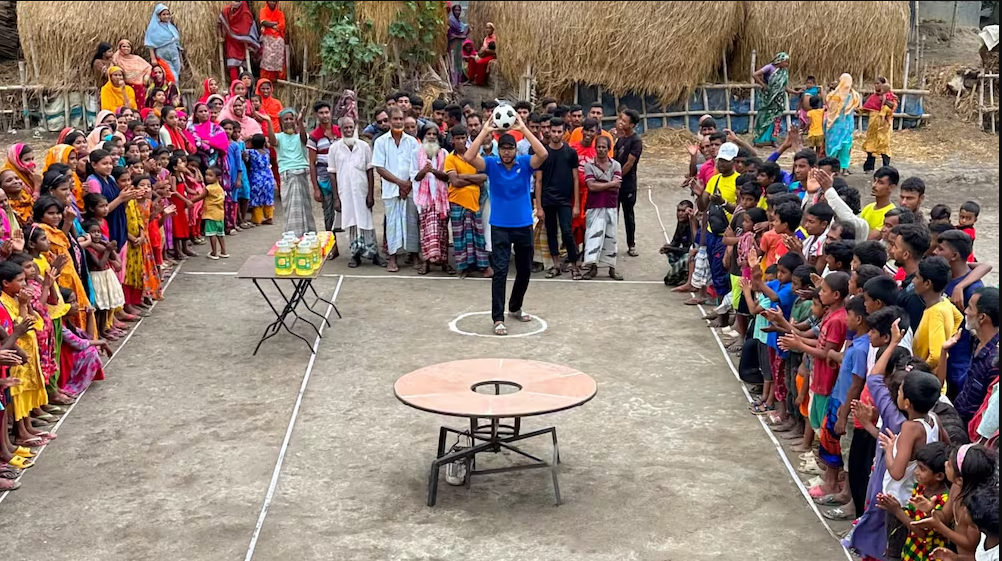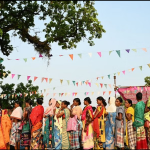'Food Challenge' for Food in Inflationary Bangladesh
The combined online views of the SS Food Challenge now exceed one and a half billion. There are about four million subscribers on YouTube and Facebook and about two lakh followers on TikTok.
Even then, the light of the sun did not fully shine in Chhapra village of Pabna district in the north-west. Before this, village resident Mohammad Abdur Rauf has already prepared. Banwarinagar village is six miles away from the destination.
Rauf arrived in Banwarinagar to play in a queue with hundreds of others. But apart from shooting arrows and bursting balloons or playing rings in bottles, he was repeatedly pushing a yellow ball with a plastic stick.
Latest news on Decent Solve Google News Channel.
But no matter how perfectly he tried, Abdur Rauf could not keep his boundaries and take the ball through the goal posts made of bones. But this did not make him sad, rather the farmer Abdur Rauf won a 250 ml bottle of oil as a consolation prize.
As soon as the game ended like that day, Abdur Rauf said with excitement in his eyes, ‘I will come to play again.’
According to a report by CNN, the game SS Food Challenge created by content creator Omar Sunny Samrat. Where Abdur Rauf is one among thousands of Bangladeshi contestants.
Omar Sani is the sole breadwinner in a family of nine, including three children, parents and two brothers.
The arrangement of this game of emperor is reminiscent of the iconic 1980 show ‘Takeshi’s Castle’. Where players had to overcome multiple physical obstacles to win.
But no one comes to play in Banwarinagar for fame, glory or cash. When commodity prices are out of reach due to rising commodity prices, they play for other staple food items including rice, pulses, oil, sugar and lentils.
“The rule here is first-come, first-served,” Samrat told CNN. And for this no registration is required. And whoever participates in these games, they are all winners.
Two years ago, following Russia’s aggression in Ukraine, Omar Sani brought up the idea of gradually increasing commodity prices in Bangladesh. The World Bank had forecasted that until the end of 2024, there would be a global trend of rising prices. With various colorful ingredients and the absence of any losses in the game, Emperor’s initiative has already gained extensive popularity.
The combined online views of the SS Food Challenge have now exceeded one and a half billion. There are nearly four million subscribers on YouTube and Facebook, and around two hundred thousand followers on TikTok.
With so many followers on social media, Samrat earns $35,000 to $45,000 per month just from online clicks and other digital monetization.
25 other people worked with the emperor. Other expenses, including the purchase of prizes, range from $5,000 to $15,000 per month. He has not taken any sponsor for this work till now.
However, this initiative was not an overnight success. Samrat, 32, started making ‘random videos’ in 2017.
By 2021, he started games for village children. Where different types of household products were given as prizes. He said that the people of the village liked the idea but did not like the award.
But a year later, when food prices began to rise and the Bangladeshi rupee depreciated against the US dollar, he stumbled upon the formula. The rupee depreciated by 20 percent against the dollar in 2022, making imports more expensive in Bangladesh.
“When the price of edible oil and even onion goes out of reach, we decide to give these food items as a reward,” said Samrat.
He said, this incident caused a huge response among the villagers. They are more motivated to play. Everyone who participates wins something. Along with some funny memories.
According to Bangladesh Bureau of Statistics data, food inflation in Bangladesh reached 9 percent between 2022 and 2023, the highest in the last 12 years.
Ruchir Desai of Asia Frontier Investments said inflation in developed and developing countries rose that year due to pandemic-related supply chain problems as well as the impact of Russia’s invasion of Ukraine in February 2022.
“It was basically the turning point, especially for an emerging market like Bangladesh,” he said.
“In addition, Dhaka had to reduce subsidies on oil and other daily necessities to get a loan of several billion dollars from the International Monetary Fund (IMF)’, said Desai.
However, analysts see a ray of hope for Bangladesh on the way forward. They have predicted that the price of goods will decrease in 2024.
And this has brought relief to people like housewife Asma Khatun, mother of four children. Recently, Asma returned to the village after winning potatoes, onions, sugar and pulses on the day of the game. These food items of his are a source of comfort for his family in the days to come.
And on the other hand this game has become so popular that now crowd control is the main concern of the emperor.




